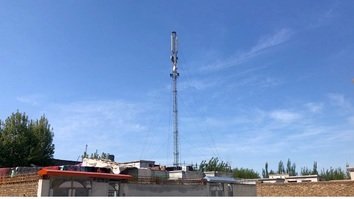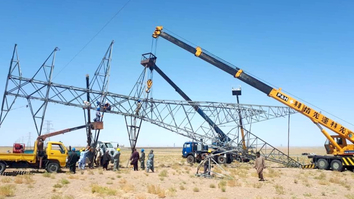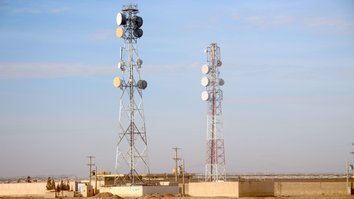HERAT -- Threats by the Taliban to blow up the towers of telecommunication carriers in Farah Province have resulted in most services being cut off in the region, stoking the anger of local residents.
The Taliban on October 5 told telecom carriers in the region to disconnect their services or face having their towers being destroyed by the militants. Only state-run Salaam Telecommunication Co. continues to provide services in the area.
The group has not provided a formal justification for the threat, but the Taliban have said they will allow restoration of telecom services in the province if Kabul halts air operations against the militant outfit, according to authorities and local residents.
The Taliban are fearful that Afghan National Defence and Security Forces (ANDSF) can track their movements at night through network antennas, security officials have suggested in the past.
![Cell phone towers can be seen in this photo taken January 30 in Zindajan District, Herat Province. [Omar]](/cnmi_st/images/2019/10/29/20614-a_3-585_329.jpg)
Cell phone towers can be seen in this photo taken January 30 in Zindajan District, Herat Province. [Omar]
Residents of Farah Province consider this act by the militants a crime against civilians and call on the group to exclude public services from their insurgency.
The shutdown of telecom services is taking its toll on local residents, said Shah Mahmud Naimi, deputy chairman of the Farah provincial council.
"The Taliban have threatened to destroy the telecom carriers' towers in the districts if they resume their services," he said. They "have disrupted the life of ordinary residents of Farah Province".
"Since the day that telecom services were disconnected, lives and businesses in Farah have been affected and problems increase by the day," he added.
"I have no news from my family in Pusht Rod District," said Mahmood, a Farah city resident who declined to give his last name. "The Taliban fear that their locations are tracked by the telecom networks, and for this reason they have threatened the telecom carriers."
"This isn't the first time," he said. "The telecom carriers have been shut down several times in the past."
This act by the Taliban has created many problems for the public, said Shekaib Faqiri, another Farah city resident.
"By doing this, the Taliban create problems for civilians, not for the government," Faqiri said.
"Business dealings have been impacted in Farah Province as the telecom carriers discontinued their services," said Dadullah Qani, a member of the Farah provincial council.
"Civiilans contact each other over mobile phones, and all their business matters are processed through this channel, but the Taliban have disrupted ordinary life."
Nighttime disruptions
In addition, telecom services have been cut off at night in districts of Herat, Ghor and Badghis provinces because of the Taliban's threats.
Telecom networks have encountered problems for the past two months in Ghor Province, said Ahmad Shah Mowahed, a resident of Firoz Koh.
"We call on the Taliban to refrain from restricting public services," he added. "Civilians have remained impartial in the current war, and therefore they shouldn't suffer any harm."
The telecom network shutdown at night is one of the biggest issues afflicting outlying parts of Herat Province, said Najibullah Mohebi, a member of the Herat provincial council.
"Residents face many issues in the districts including during emergencies and situations ... when they have to contact their relatives, but they have remained deprived of telecom services," he said.
"The Taliban's politics and ideology have always been backward," added Mohebi. "The Taliban don't want Afghanistan to prosper, and they don't want Afghans to have access to technology."
"The Taliban's goal is to deprive the public of connectivity so that they can [promote and] implement their ignorant thoughts on society," he said.
Toll on civilians
Residents do not understand how the Taliban can justify their behaviour since it is civilians who use the services, said Muhammad Farid Akhizi, a member of the Badghis provincial council.
"Telecom services have been shut at night for two months in the entirety of Badghis Province, and this has caused a multitude of problems," he said. "Connectivity stops as night falls, and [then] the users no longer have a clue of what is happening with their friends and families."
"It is the 21st century in which other countries have access to advanced technology and communication, but the Taliban don't let Afghans use even their mobile phones," added Akhizi.
"This is truly a historic shame for the Taliban, and they will be recorded in history as an infamous group," he said.
Since the Taliban lack the ability to fight security forces, they instead persecute telecom carriers and civilian institutions, said Herat deputy governor Ghulam Daud Hashemi.
"The Taliban don't have the ability to attack the telecom networks and their towers in Herat Province, but the telecom carriers shut down their services at night in Herat districts because of bad security and the Taliban's threats to them in other provinces," he said.
"The Taliban have told telecom carriers ... that if they didn't disconnect their services in the districts of Herat, they would blow up their towers in those provinces," said Hashemi.
"This act by the Taliban harms the public," he added. "It doesn't inflict any damage on the government or the security forces, but it does take a toll on civilians."







